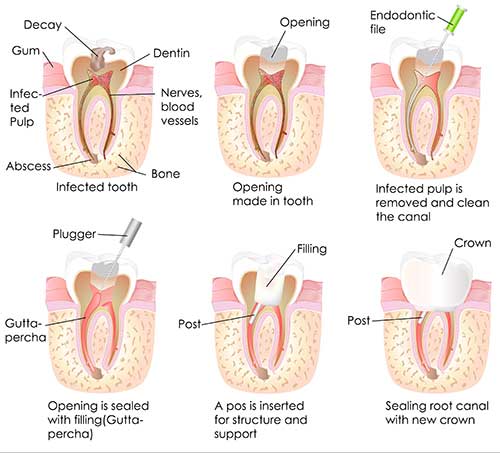Root Canal in Saudi Arabia
Search and Compare the Best Clinics and Doctors at the Lowest Prices for Root Canal in Saudi Arabia

Find the best clinics for Root Canal in Saudi Arabia
No clinics available
Vietnam offers the best prices Worldwide
Price: $ 1

- Home
- Saudi Arabia
WHY US?
At Medijump, we're making medical easy. You can search, compare, discuss, and book your medical all in one place. We open the door to the best medical providers worldwide, saving you time and energy along the way, and it's all for FREE, no hidden fees, and no price markups guaranteed. So what are you waiting for?

Free

Best Price

Widest Selection

Risk-Free
What you need to know about Root Canal in Saudi Arabia

A root canal, also called endodontics, is a dental procedure to treat infection at the center of a tooth. It can repair or save a tooth that is infected or badly decayed instead of removing it. The term “root canal” comes from the act of cleaning the canal inside the tooth’s root.
What does a Root Canal Procedure Involve?
With dental advances and the help of local anesthetics, a root canal is not painful. During the procedure, your dentist removes the pulp and the nerve, then the bacteria are removed and the inside of the tooth is cleaned. The final step is sealing the inside of the tooth with a filling or crown.
How Long Should I Stay in Saudi Arabia for a Root Canal Procedure?
A root canal is usually performed as an outpatient procedure, meaning you can leave the medical facility straight after the procedure. However, you need to stay in Saudi Arabia for around 2 to 7 days, especially if your tooth has several roots that require more than 1 appointment.
What's the Recovery Time for Root Canal Procedures in Saudi Arabia?
Your tooth may feel sensitive for a few days after a root canal. Over-the-counter painkillers will help you with any discomfort. You can go back to work and return to your normal routine the next day or as soon as you arrive in your home country.
What sort of Aftercare is Required for Root Canal Procedures in Saudi Arabia?
After a root canal, you should avoid biting on hard foods for a few days. You also need to keep your teeth clean, limit sugary food, and give up smoking to avoid further root canal treatment.
What's the Success Rate of Root Canal Procedures in Saudi Arabia?
The root canal procedure is almost always successful, with over 95% success rate. Many teeth fixed with this procedure can last for 10 years to a lifetime. The side effect of a root canal is tooth sensitivity, but this will subside within a few days. The risks include the loss of the tooth or abscess development on the tooth, but this is very rare.
Are there Alternatives to Root Canal Procedures in Saudi Arabia?
If you are apprehensive about a root canal, your alternatives include tooth extraction and replacing it with a dental implant, bridge, or partial denture to restore your chewing function and prevent adjacent teeth from shifting.
What Should You Expect Before and After the Procedure
An infected or a badly decayed tooth is painful, and they can interfere with your life. After a root canal procedure, you will no longer feel any pain and you can enjoy your life again.
Whilst the information presented here has been accurately sourced and verified by a medical professional for its accuracy, it is still advised to consult with your doctor before pursuing a medical treatment at one of the listed medical providers
No Time?
Tell us what you're looking for and we'll reachout to the top clinics all at once
Enquire Now

Popular Procedures in Saudi Arabia
Prices Start From $1

Prices Start From $1

Prices Start From $48

Prices Start From $1

Prices Start From $1

Prices Start From $11

Prices Start From $45

Recommended Medical Centers in Saudi Arabia for procedures similar to Root Canal

- Interpreter services
- Translation service
- Religious facilities
- Medical records transfer
- Medical travel insurance
- Health insurance coordination
- TV in the room
- Safe in the room
- Phone in the room
- Private rooms for patients available

- Interpreter services
- Translation service
- Religious facilities
- Medical records transfer
- Medical travel insurance
- Health insurance coordination
- TV in the room
- Safe in the room
- Phone in the room
- Private rooms for patients available

- Interpreter services
- Translation service
- Religious facilities
- Medical records transfer
- Medical travel insurance
- Health insurance coordination
- TV in the room
- Safe in the room
- Phone in the room
- Private rooms for patients available

- Interpreter services
- Translation service
- Religious facilities
- Medical records transfer
- Medical travel insurance
- Health insurance coordination
- TV in the room
- Safe in the room
- Phone in the room
- Private rooms for patients available
Root Canal in and around Saudi Arabia
Introduction
The Kingdom of Saudi Arabia is the birthplace of Islam and is home to the holy Muslim city of Mecca, all Muslims are required to make a pilgrimage to this city at least once during their life and non-Muslims are forbidden from the city. There are other wonders to be found here, from the Red Sand Dunes in Riyadh, Jeddah’s coral architecture, to the azure waters of the Red Sea. In the last few years, the Kingdom has developed a plan to encourage international patients to seek treatment at its medical centers. The healthcare sector in the country has constantly improved and developed and the country has all the attributes to have a successful medical tourism industry, such as ultra-modern hospitals that are well-equipped with cutting-edge technology, foreign-trained doctors and specialists, and a well-established private healthcare sector.
Popular Cities and Regions in Saudi Arabia
The capital city is Riyadh, which is one of the wealthiest cities in the world. It offers amazing attractions for tourists, such as the Masmak Fortress, the National Museum, the Kingdom Center, the Sky Bridge, Riyadh Zoo, and the Antiquities Museum. Another popular city is Jeddah, which is called the Bride of the Red Sea. It’s a large metropolitan city with an incredible waterfront and beautiful old town. It’s the traditional gateway to Mecca, as well as the historic crossroads of traders and pilgrims. Most tourists visit this city to admire its World Heritage Red Sea architecture, explore its lively souq, relax in its laid-back coastline, and try its world-class cuisine.
Transport in Saudi Arabia
King Fahd International Airport is the largest airport in Saudi Arabia, located in the city of Dammam. It serves flights to and from numerous cities in Europe, Asia, and the Middle East. Domestic flights are the best way to travel around this country. Buses, taxis, and car rental are widely available for travel inside the cities.
Visas in Saudi Arabia
Almost all nationalities need to have a visa to visit Saudi Arabia, except for citizens of Bahrain, Kuwait, Oman, and the UAE. eVisa or visa on arrival is available for holders of passports of 51 countries, including all EU countries, the US, the UK, and Japan. Most other countries need to obtain a visa prior to arrival.
Weather in Saudi Arabia
Saudi Arabia has two seasons, summer and winter. Summer (April – October). The weather is extremely hot and humid. The average temperatures range between 40oC to 45oC, but it can soar to 49oC. Winter, from November to March, brings mild temperatures, with an average of 20oC during the day and 10oC during the night.
Additional Info
- Local Currency: Saudi riyal (SAR) is the currency. 1 USD is equivalent to 3.75 SAR.
- Money & Payments: ATMs are widespread and credit cards are widely accepted. There is no tipping culture.
- Local Language: Arabic is the official language, but English is widely spoken.
- Local Culture and Religion: Women do not need to wear abayas (a long black, robe-like dress) anymore, except at religious sites. However, both men and women have to wear modest clothing and refrain from showing too much skin. Islam is the state religion and the country’s law requires all citizens to be Muslim. Any non-Muslims who want to acquire Saudi Arabian nationality will have to convert to Islam. There are Hindus, Christians, and Buddhists in the country but all of them are foreign nationals.
- Public Holidays: The most celebrated public holidays in Saudi Arabia are Eid Al-Fitr, Eid Al-Adha, ad National Day.
Popular Searches
- Plastic Surgery in Thailand
- Dental Implants in Thailand
- Hair Transplant in Thailand
- Breast Augmentation Thailand
- Gastric Sleeve in Thailand
- Gender Reassignment Surgery in Thailand
- Laser Hair Removal in Bangkok
- Botox in Bangkok
- Dermatology in Bangkok
- Breast Augmentation in Bangkok
- Coolsculpting in Bangkok
- Veneers in Turkey
- Hair Transplant in Turkey
- Rhinoplasty in Turkey
- Stem Cell Therapy in Mexico
- Rhinoplasty in Mexico
- Liposuction in Mexico
- Coolsculpting in Tijuana
- Rhinoplasty in Korea
- Scar Removal in Korea
- Gastric Sleeve in Turkey
- Bone Marrow Transplant in India
- Invisalign in Malaysia
- Plastic Surgery in the Dominican Republic
- Tummy Tuck in the Dominican Republic
- Plastic and Cosmetic Surgery in Poland
- Rhinoplasty in Poland
- Hair Implant in Poland
- Dental Implants in Poland
- IVF in Turkey